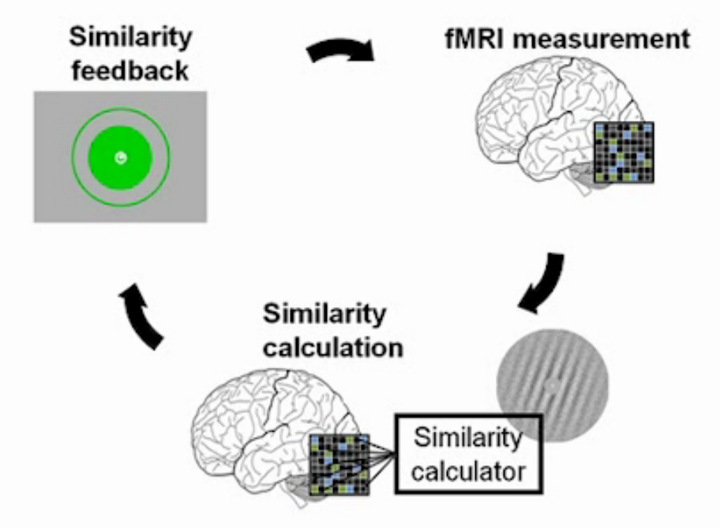That said, he is an interesting guy who knows interesting people.
Here's Amara Angelica at the Kurzweil blog:
OK, this one’s right out of The Matrix and The Manchurian Candidate.From March 2011:
Imagine watching a computer screen while lying down in a brain imaging machine and automatically learning how to play the guitar or lay up hoops like Shaq O’Neal, or even how to recuperate from a disease — without any conscious knowledge.
Researchers at Boston University (BU) and ATR Computational Neuroscience Laboratories in Kyoto, Japan used decoded functional magnetic resonance imaging (fMRI) to induce visual cortex activity patterns to match a previously known target state and thereby improve performance on visual tasks.
“Adult early visual areas are sufficiently plastic to cause visual perceptual learning,” said lead author and BU neuroscientist Takeo Watanabe, director of BU’s Visual Science Laboratory.
Neuroscientists have previously found that pictures gradually build up inside a person’s brain, appearing first as lines, edges, shapes, colors and motion in early visual areas. The brain then fills in greater detail to make a red ball appear as a red ball, for example. Researchers studied the early visual areas for their ability to cause improvements in visual performance and learning.
“However, none of these studies directly addressed the question of whether early visual areas are sufficiently plastic to cause visual perceptual learning,” said Watanabe. So they used decoded fMRI neurofeedback to induce a particular activation pattern in targeted early visual areas that corresponded to a pattern evoked by a specific visual feature in a brain region of interest. The researchers found that repetitions of the activation pattern caused long-lasting visual performance improvement on that visual feature — without the subject’s active involvement. The method could be used for improving memory or motor (muscle) skills, the researchers suggest.
But that’s where is gets a bit scary. “In theory, hypnosis or a type of automated learning is a potential outcome,” said Kawato. “However, in this study we confirmed the validity of our method only in visual perceptual learning. So we have to test if the method works in other types of learning in the future. At the same time, we have to be careful so that this method is not used in an unethical way.”...MORE
"Solar: Kurzweil Sees Energy Need Met In 16 Years"
We also have "Ray Kurzweil: Cost Competitive Solar Within Five Years" from June 2008. I don't think Ray's going to make it by 2013.
Last week I said, en passant, "The current McKinsey Quarterly has an interview with Ray Kurzweil, arguably one of the slipperiest prognosticators currently predicting. On the other hand the McKinsey folks I've met told good jokes."
Be that as it may be, here's Tech Trader Daily:
Inventor and futurist Ray Kurzweil was the subject of a brief interview at the Big Think blog late yesterday, in which the editors write that Kurzweil projects solar energy will be able to meet all the world’s energy needs in 16 years from now.With two interviews within a week I should have checked to see if Mr. K. has a new book coming out.
Kurzweil cites the dramatic improvement curve of nanotechnology used in solar panels, and predicts it will take “eight doublings” of the technology to meet energy demand through solar....MORE
Here is some of the back-and-forth on Mr. Kurzweil's predictions. In 2010 he said he was batting 102 of 108 which raises the question: Is he predicting the inevitable?
A simple example would be "smaller computers". A prognosticator doesn't get any points from me on that type of prediction.
First up, the brainiacs at IEEE Spectrum:
Ray Kurzweil's Slippery Futurism
Techi's headline is:
Ray Kurzweil's Tech Predictions Have Been Eerily Accurate
Kurzweil fans SingularityHub write:
Kurzweil Defends Predictions for 2009, Says He is 102 for 108.
Finally, Next Big Future has a response from Ray and an update from a skeptic:
Ray Kurzweil Responds to the Issue of Accuracy of His Predictions
Update: Ray Kurzweil’s January 17th, 2010 response to this is posted below my initial post. He said, “your review is biased, incorrect, and misleading in many different ways”....More than you cared to know?
